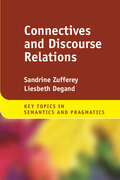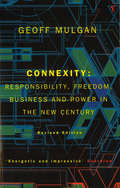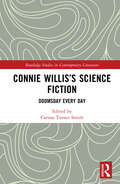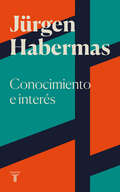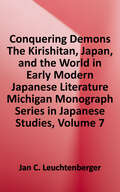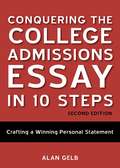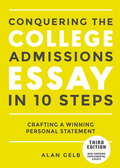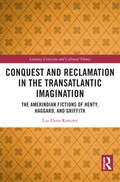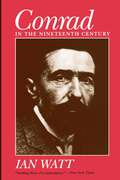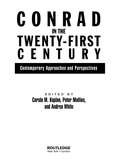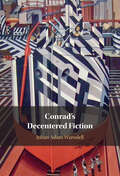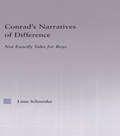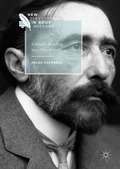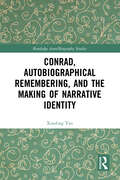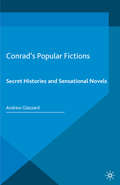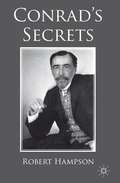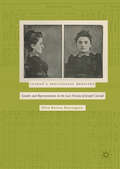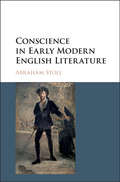- Table View
- List View
Connections: Writing & Language, High School
by Jo Pitkin Cynthia Clampitt Carol Francis Larkin Page-JacobsNIMAC-sourced textbook
Connectives and Discourse Relations (Key Topics in Semantics and Pragmatics)
by Sandrine Zufferey Liesbeth DegandIllustrated with examples from a rich range of languages and genres, this book provides a state-of-the-art introduction to the meanings and functions of connectives, and the discourse relations they communicate. It begins with theoretical chapters that illustrate the many interfaces present in the study of connectives and discourse relations, using diachronic data to illustrate how connectives incorporate such a wide range of functions in synchronic language use. The second half of the book presents the rapidly growing body of studies that have used empirical data to assess theories of connectives and discourse relations, spanning fields as diverse as discourse processing, first and second language acquisition, and cross-linguistic studies. End-of-chapter discussion questions and lists of further readings are included, along with a comprehensive glossary of key terms. This title is part of the Flip it Open Programme and may also be available open access. Check our website Cambridge Core for details.
Connexity: How to Live in a Connected World
by Geoff MulganCONNEXITY is the philosophical counterpart to Will Hutton's essentially political book. It looks at the profound tension that exists between two recent achievements of humanity: greater freedom (over how to live, who to love, what to believe and say, where to trade), and greater interdependence, or 'connexity' (through the financial markets, military structures, the internet, the ecosystem). This tension has led to crisis: institutions, including governments, sense themselves to be inadequate; individuals are faced with a mass of conflicting information and values. The issue we face, which will ultimately determine human survival in our densely packed planet, is how the tension between these two can be resolved, and a new order established. Mulgan presents his own powerful solution to this crisis. It is based around the notion of 'connexity': breaking down our rigid sense of ourselves as isolated units and seeing our lives as part of a system, a positive network of co-responsibility.
Connie Willis’s Science Fiction: Doomsday Every Day (Routledge Studies in Contemporary Literature)
by Carissa Turner SmithIn spite of Connie Willis’s numerous science fiction awards and her groundbreaking history as a woman in the field, there is a surprising dearth of critical publication surrounding her work. Taking Doomsday Book as its cue, this collection argues that Connie Willis’s most famous novel, along with the rest of her oeuvre, performs science fiction’s task of cognitive estrangement by highlighting our human inability to read the times correctly—and yet also affirming the ethical imperative to attempt to truly observe and record our temporal location. Willis’s fiction emphasizes that doomsdays happen every day, and they risk being forgotten by some, even as their trauma repeats for others. However, disasters also have the potential to upend accepted knowledge and transform the social order for the better, and this collection considers the ways that Willis pairs comic and tragic modes to reflect these uncertainties.
Conocimiento e interés
by Jurgen HabermasLa obra clave para entender el pensamiento de Habermas, pensador emblemático de la Escuela de Frankfurt.Este es probablemente el libro más célebre del filósofo alemán Jürgen Habermas y la obra que catapultó su carrera. Publicado en 1968-en el contexto de la disputa sobre el positivismo-, examina las corrientes más importantes del pensamiento moderno: kantismo yhegelianismo,pragmatismo anglosajón y tradición hermenéutica alemana, marxismo y psicoanálisis. Mediante el análisis de estas corrientesde pensamiento,Habermas analiza los procesos de investigación que determinan el significado y la validez de nuestras afirmaciones científicas.Únicamente una teoría social permite una crítica radical del conocimiento, esa es la tesis esencial de Habermas. Con esta premisa, nosolo intervieneen la discusión positivista orientada a cuestiones de método, sino también en la discusión política orientada a la práctica.
Conquering Demons: The Kirishitan, Japan, and the World in Early Modern Japanese Literature (Michigan Monograph Series In Japanese Studies)
by Jan C. LeuchtenbergerThese sensational fictional accounts of a near conquest of Japan by a kind of mythical Kirishitan, who used money and magic to gain converts in their attempt to take over Japan, are studied in the context of the publication trends of the time they were produced, as well as of the cultural and political attitudes toward Christianity that prevailed when they were written. Leuchtenberger also analyzes the representations of Japan and the Kirishitan that appear in these texts in the context of contemporary discourses on the world and Japan's place in it. New maps and information brought by the missionaries and traders to Japan reflected a world that looked very different from the traditional Sino-centric one. These anti-Kirishitan popular narratives meet the challenge of this new world by expelling it and reasserting the conventional three-realms world order, in which Japan plays an influential role. This is done most obviously in the expulsion of the Kirishitan that is narrated in the texts, but it is also achieved on another level by the representation of the Kirishitan as uncouth and very common villains. Conquering Demons features a new look at anti-Kirishitan works from a literary perspective, examining them in the context of developments in the publishing industry and in the broader discourses on Japan and many Others in the world. It is of interest most broadly to scholars and teachers of Japanese history and literature, but also to those dealing with questions of identity and Othering, issues of "mapping" Japan and the world, and the role of manuscript culture in Edo-period literature. The translations provide an entertaining and relatively rare look at some Japanese representations of Westerners and would be useful in undergraduate classes on Japanese history, culture, and literature.
Conquering Writing Anxiety
by Cynthia A. AremMany college students struggle with writing anxiety and subsequently avoid taking classes with significant writing requirements. Conquering Writing Anxiety, provides students with the necessary tools and effective, practical techniques to help reduce their anxiety and make them feel more comfortable and confident in their writing ability.
Conquering the College Admissions Essay in 10 Steps, Second Edition: Crafting a Winning Personal Statement
by Alan GelbA guide to crafting a meaningful and polished college admissions essay that gets students into the school of their dreams by expressing their unique personality, strengths, and goals.Stand out from the crowd with a memorable, meaningful personal statement that will capture the attention of college admissions officers. Writing a college admissions essay is no easy task--but with college essay coach and New York Times contributor Alan Gelb's accessible and encouraging step-by-step instructions, you'll be able to write an honest, one-of-a-kind essay that really shines. Gelb's ten-step approach has garnered great results for the students who have tried it, many of whom were accepted into their dream schools (Harvard, Brown, Yale, and more). This to-the-point handbook shows you how to identify an engaging essay topic, and then teaches you how to use creative writing techniques to craft a narrative that expresses your unique personality, strengths, and goals. Whether you're an A-student looking for an extra boost or a less-confident writer who needs more intensive help, Gelb's reassuring and concise guidance will help you every step of the way, from your initial draft to final revision. In the end, you will have a well-polished, powerful, and profound personal statement that you can feel proud of--a college essay that doesn't feel "pre-fab," but is a real reflection of your own individuality.
Conquering the College Admissions Essay in 10 Steps, Third Edition: Crafting a Winning Personal Statement
by Alan GelbThe definitive guide to writing an amazing essay and mastering the college applications process.Writing a memorable personal statement can seem like an overwhelming project for a young college applicant, but college essay coach Alan Gelb's organized and encouraging step-by-step instructions take the intimidation out of the process, enabling applicants to craft a meaningful and polished college admissions essay. Gelb teaches students to identify an engaging topic and use creative writing techniques to compose a vivid statement that will reflect their individuality. A consistent top-seller in the college prep category, Conquering the College Admissions Essay in 10 Easy Steps has been revised to include extra information on supplemental and waitlist essays. This much-needed handbook will help applicants win over the admissions dean, while preparing them to write better papers once they've been accepted.For more, visit the author’s website at www.conquerthecollegeessay.com.
Conquest and Reclamation in the Transatlantic Imagination: The Amerindian Fictions of Henty, Haggard, and Griffith (Literary Criticism and Cultural Theory)
by Luz Elena RamirezThis book examines the imperial spectacles and startling reversals of fortune related in William H. Prescott's History of the Conquest of Mexico (1843) and History of the Conquest of Peru (1847), and investigates how these accounts inspired fictional adaptations by George A. Henty, H. Rider Haggard, and George Griffith. The revision of history in the Amerindian adventure both entertained young transatlantic audiences and was a vehicle to attract tourism and investment in countries such as Mexico and Peru. Henty, Haggard, and Griffith, moreover, used their tales of adventure as a platform to impart British values to their readers. Such values compel the characters and narrators of the novels discussed to act as cultural mediators, to acquire indigenous languages and adopt native ways of being, and, in several of the romance adventures under consideration, to marry Mexican or Incan noblewomen. Part I, Conquest, examines George Henty’s By Right of Conquest: Or, With Cortez in Mexico (1891), H. Rider Haggard’s Montezuma’s Daughter (1893), and George Griffith’s Virgin of the Sun: A Tale of the Conquest of Peru (1898). Part II, Reclamation, argues that English re-writings of history work to eclipse the Spanish in Haggard’s Virgin the Sun (1922), Henty’s Treasure of the Incas (1902) and Griffith’s Romance of Golden Star (1897).
Conquest and Reclamation in the Transatlantic Imagination: The Amerindian Fictions of Henty, Haggard, and Griffith (Literary Criticism and Cultural Theory)
by Luz Elena RamirezThis book examines the imperial spectacles and startling reversals of fortune related in William H. Prescott's History of the Conquest of Mexico (1843) and History of the Conquest of Peru (1847), and investigates how these accounts inspired fictional adaptations by George A. Henty, H. Rider Haggard, and George Griffith. The revision of history in the Amerindian adventure both entertained young transatlantic audiences and was a vehicle to attract tourism and investment in countries such as Mexico and Peru. Henty, Haggard, and Griffith, moreover, used their tales of adventure as a platform to impart British values to their readers. Such values compel the characters and narrators of the novels discussed to act as cultural mediators, to acquire indigenous languages and adopt native ways of being, and, in several of the romance adventures under consideration, to marry Mexican or Incan noblewomen. Part I, Conquest, examines George Henty’s By Right of Conquest: Or, With Cortez in Mexico (1891), H. Rider Haggard’s Montezuma’s Daughter (1893), and George Griffith’s Virgin of the Sun: A Tale of the Conquest of Peru (1898). Part II, Reclamation, argues that English re-writings of history work to eclipse the Spanish in Haggard’s Virgin the Sun (1922), Henty’s Treasure of the Incas (1902) and Griffith’s Romance of Golden Star (1897).
Conrad in the Nineteenth Century
by Ian Watt"Nothing short of a masterpiece. . . . One of the great critical works produced since the 1950s."—New York Times
Conrad in the Twenty-First Century: Contemporary Approaches and Perspectives
by Andrea White Peter Mallios Carola M. KaplanBest known as the author of Heart of Darkness , Joseph Conrad (1857-1924) is one of the most widely taught writers in the English language. Conrad's work has taken on a new importance in the dawning of the 21st century: in the wake of September 11 many cultural commentators returned to his novel The Secret Agent to discuss the roots of terrorism, and the overarching theme of colonialism in much of his work has positioned his writing as central to not only literature scholars, but also to postcolonial and cultural studies scholars and, more recently, to scholars interested in globalization. Reading Conrad Now is a collection of original essays by leading Conrad scholars that rereads Conrad in light of his representations of post-colonialism, of empire, imperialism, and of modernism and modernity-questions that are once again relevant today. The collection is framed by an introduction by J. Hillis Miller-one of the most important literary critics today-and a concluding extensive interview with Edward Said (one of his final interviews before his death on September 25, 2003)- the most prominent postcolonial critic-addressing his lifelong fascination with Conrad. Reading Conrad Now will be essential reading for anyone seeking a contemporary introduction to this great writer, and will be of great interest to scholars working with Conrad in a variety of fields including literary studies, cultural studies, ethnic and area studies, and postcolonial studies.
Conrad's Decentered Fiction
by Johan Adam WarodellWhat are the fingerprints of Joseph Conrad's fiction? This richly illustrated book argues that Conrad's vibrant details set him apart as a writer and brings them from the margins to the center for study. With recently discovered primary sources - including drawings and maps in Conrad's own hand - this book travels widely across Conrad's fiction and explores its interest in marginal voices, characters and details. It produces a new picture of Conrad as a writer, and the first picture of Conrad as an amateur sketch artist. Introducing new critical vocabulary and applying new names from art history to Conrad studies, the book ranges across cartography, fashion, analytic philosophy, manuscript studies, and animal studies to discover Conrad as an artist operating across and between different media. Offered as a complement to the abstract approaches of much literary theory, this detail-driven and margin-focused monograph mirrors the characteristic granular nature of Conrad's fiction.
Conrad's Narratives of Difference: Not Exactly Tales for Boys (Studies in Major Literary Authors #26)
by Lissa SchneiderIn Joseph Conrad’s tales, representations of women and of "feminine" generic forms like the romance are often present in fugitive ways. Conrad’s use of allegorical feminine imagery, fleet or deferred introductions of female characters, and hybrid generic structures that combine features of "masculine" tales of adventure and intrigue and "feminine" dramas of love or domesticity are among the subjects of this literary study. Many of Conrad’s critics have argued that Conrad’s fictions are aesthetically flawed by the inclusion of women and love plots; thus Thomas Moser has questioned why Conrad did not "cut them out altogether." Yet a thematics of gender suffuses Conrad’s narrative strategies. Even in tales that contain no significant female characters or obvious love plots, Conrad introduces elusive feminine presences, in relationships between men, as well as in men’s relationships to their ship, the sea, a shore breeze, or even in the gendered embrace of death. This book investigates an identifiably feminine "point of view" which is present in fugitive ways throughout Conrad’s canon. Conrad’s narrative strategies are articulated through a language of sexual difference that provides the vocabulary and grammar for tales examining European class, racial, and gender paradigms to provide acute and, at times, equivocal investigations of femininity and difference.
Conrad's Reading: Space, Time, Networks (New Directions in Book History)
by Helen ChambersThis book aligns concepts and methods from book history with new literary research on a globally studied writer. An innovative three-part approach, combining close reading the evidence of reading, scrutiny of international book distribution circuits, and of Conrad's many fictional representations of reading, illuminates his childhood, maritime and later shore-based reading. After an overview of the empirical evidence of Conrad's reading, his sparsely documented twenty years reading at sea and in port is reconstructed. An examination the reading practices of his famous narrator Marlow then serves to link Conrad's own maritime and shore-based reading. Conrad's subsequent networked reading, shared with his closest male friends, and with literate multilingual women, is examined within the context of Edwardian reading practices. His fictional representations of reading and material texts are highlighted throughout, including genre trends, periodical reading, reading spaces and their lighting, and the use of reading as therapy. The book should appeal both to Conrad scholars and to historians of reading.
Conrad, Autobiographical Remembering, and the Making of Narrative Identity (Routledge Auto/Biography Studies)
by Xiaoling YaoDrawing on recent studies on life writing, memory, the narrative turn, and psychology, Conrad, Autobiographical Remembering, and the Making of Narrative Identity is the first major work that extensively explores the dynamic interplay between Conrad’s autobiographical remembering and storytelling in relation to his identity construction within a historical and cultural context. This unique perspective makes the book particularly attractive for students, teachers, and researchers of Conrad. Contrary to the prevalent "achievement-and-decline" paradigm that implies a decline in quality of Conrad’s works in his later period, this volume contends that Conrad’s later works continue to engage with the complex questions of memory, identity, and culture, demonstrating a sustained commitment to exploring the intricacies of the human experiences. Essential reading for Conrad enthusiasts, but also for those who seek to explore how memory studies in literature intersect with psychology, philosophy, and cultural studies.
Conrad’s Popular Fictions: Secret Histories and Sensational Novels
by Andrew GlazzardDetectives, police informers, spies and spymasters, anarchists and terrorists, swindlers: these are the character types explored in Conrad's Popular Fictions. This book shows how Joseph Conrad experimented creatively with genres such as crime and espionage fiction, and sheds new light on the sources and contexts of his work.
Conrad’s Secrets
by Robert HampsonConrad's Secrets explores a range of knowledges which would have been familiar to Conrad and his original readers. Drawing on research into trade, policing, sexual and financial scandals, changing theories of trauma and contemporary war-crimes, the book provides contexts for Conrad's fictions and produces original readings of his work.
Conrad’s Sensational Heroines: Gender and Representation in the Late Fiction of Joseph Conrad
by Ellen Burton HarringtonThis volume considers Joseph Conrad's use of multiple genres, including allusions to sensation fiction, pornography, anthropology, and Darwinian science, to respond to Victorian representations of gender in layered and contradictory representations of his own. In his stories and later novels, the familiar writer of sea stories centered on men moves to consider the plight of women and the challenges of renegotiating gender roles in the context of the early twentieth century. Conrad's rich and conflicted consideration of subjectivity and alienation extends to some of his women characters, and his complex use of genre allows him both to prompt and to subvert readers' expectations of popular forms, which typically offer recognizable formulas for gender roles. He frames his critique through familiar sensationalized typologies of women that are demonstrated in his fiction: the violent mother, the murderess, the female suicide, the fallen woman, the adulteress, and the traumatic victim. Considering these figures through the roles and the taxonomies that they simultaneously embody and disrupt, this study exposes internalized patriarchal expectations that Conrad presents as both illegitimate and inescapable.
Conscience in Early Modern English Literature
by Abraham StollConscience in Early Modern English Literature describes how poetry, theology, and politics intersect in the early modern conscience. In the wake of the Reformation, theologians attempt to understand how the faculty works, poets attempt to capture the experience of being in its grip, and revolutionaries to assert its authority for political action. The result, Abraham Stoll argues, is a dynamic scene of conscience in England, thick with the energies of salvation and subjectivity, and influential in the public sphere of Civil War politics. Stoll explores how Shakespeare, Spenser, Herbert, and Milton stage the inward experience of conscience. He links these poetic scenes to Luther, Calvin, and English Reformation theology, and to the public discourses of conscience in the toleration debates, among Levellers, and in the prose of Hobbes and Milton. In the literature of the early modern conscience, Protestant subjectivity evolves toward the political subject of modern liberalism.

